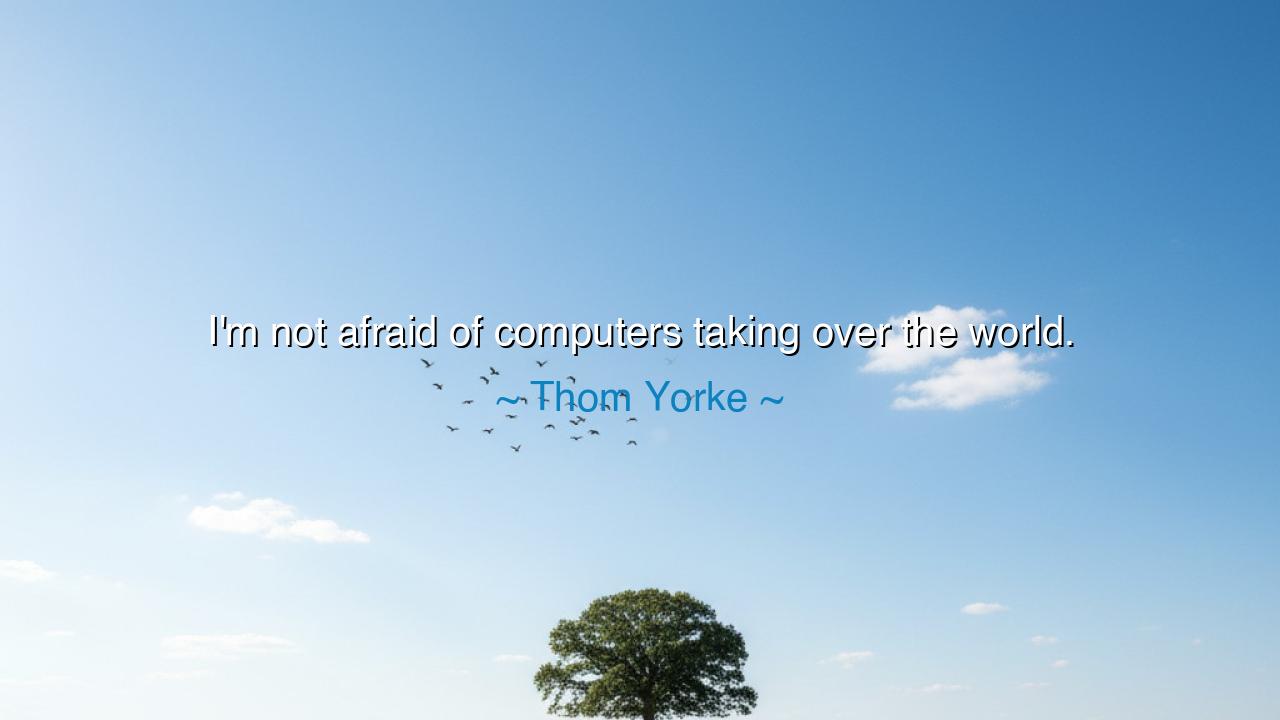
I'm not afraid of computers taking over the world.






In the days of old, when the first sparks of humanity's wisdom were being kindled, there were those who feared the unknown—be it the vast wilderness, the rising of new kingdoms, or the birth of strange technologies. Fear, that ancient beast, lurked at the edges of progress, seeking to turn potential into peril. Yet, the wise ones of the past, those who shaped the course of history, knew that fear, though natural, should never be allowed to rule the heart. Thom Yorke, a modern philosopher of our age, echoes this ancient wisdom when he says, "I'm not afraid of computers taking over the world." These words, spoken in the midst of a digital revolution, carry a truth that transcends time and speaks directly to the heart of humanity's relationship with its own creations.
Yorke's statement is not one born from ignorance or naivety, but from an understanding of the human spirit's capacity to adapt and endure. The computer, a creation of man, is not a force to be feared, but a tool to be wielded. It is not the computer itself that threatens the world, but how we, the creators, choose to use it. Much like the wheel or the sword, the computer can be used to uplift or to destroy. And yet, for all the fear surrounding the idea of computers taking over, history has shown that it is humanity—with all its ingenuity, ambition, and flaws—that will ultimately shape the future, not the tools it creates.
Consider the invention of the printing press, a marvel of its time. When it was first created, many feared that it would lead to the unraveling of society, to the spread of uncontrolled knowledge, and to the dissolution of established power structures. And yet, instead of chaos, the printing press sparked a renaissance of thought, art, and discovery. It was not the press itself that shaped history, but the minds that used it to create a new era of enlightenment. Similarly, the computer, far from being a harbinger of doom, holds within it the potential for a new age of creation, where humanity's potential is amplified, not diminished.
The story of Daedalus, the ancient craftsman and inventor, offers another parallel. He created the labyrinth, a complex maze designed to imprison the Minotaur, but he also created wings for his son, Icarus, to escape the labyrinth’s confines. Daedalus's creations, like the computer of today, were neither good nor evil in themselves—they were tools shaped by human hands, capable of both wonder and peril. Icarus, in his hubris, flew too close to the sun, his wings melting away, a reminder that the creator’s wisdom must guide the creation. Yet, despite the tragic end of Icarus, the wings themselves remained a symbol of human creativity and freedom, not of destruction.
In the same way, Yorke’s words remind us that the computer is not the source of our downfall, but rather, our relationship with it. The fear of machines taking over is rooted in the same misunderstanding that plagued past generations when they feared new technologies. Humanity, with its creativity, its drive, and its wisdom, will always be the true force that shapes the world. The computer, like the tools of ancient artisans, will bend to our will, or it will be discarded when it no longer serves us. The key, as always, lies in how we choose to wield it.
Thus, the lesson here is one of empowerment. Rather than fearing the future, we must embrace it with open arms, understanding that it is our hands that guide the course of progress. Thom Yorke's perspective challenges us to rise above fear and to approach technology not as a force to be controlled, but as a tool to be used wisely. Just as the great builders of the past harnessed the power of nature to build empires, so too must we harness the power of technology to build a better world. Fear of the unknown will never lead to progress; it is action, tempered by wisdom, that will guide us to a future where humanity thrives alongside the tools it creates.
The practical lesson, then, is to use our creativity and wisdom to shape the future. Do not fear the tools we create, but seek to understand them, to use them for the betterment of humanity. The computer, like all inventions, is but a reflection of our minds, and as such, it is up to us to ensure that it serves the greater good. Fear has no place in the heart of the innovator. Action does. As we move forward into the unknown, let us do so with courage, knowing that it is not the machines that will define us, but our choices, our wisdom, and our capacity to create a future that honors both humanity and technology.






AAdministratorAdministrator
Welcome, honored guests. Please leave a comment, we will respond soon